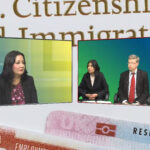Indiaspora, a nonprofit organization that unites global leaders of Indian origin from diverse backgrounds and professions, has noted that H-1B visa holders have long been recognized as vital contributors to America’s innovation economy, serving as entrepreneurs, researchers, and leaders in technology and science. A growing body of research underscores their transformative role in job creation, scientific advancement, and strengthening the U.S. tax base.
“H-1B holders have historically become the architects of innovation, founding companies that generate hundreds of thousands of American jobs and contribute billions in tax revenue to federal, state, and local governments,” according to recent findings highlighted by Indiaspora in collaboration with the Boston Consulting Group.
The economic impact of these skilled immigrants extends well beyond direct employment. “The economic multiplier effect of skilled immigration extends far beyond individual employment,” the report noted. These professionals fuel entrepreneurship, enhance U.S. competitiveness, and provide critical support to sectors ranging from education to infrastructure.
Startups, in particular, rely heavily on H-1B talent. “Many startups depend on H-1B employment authorization to recruit specialized talent at competitive costs, enabling them to scale effectively and compete with larger corporations,” the study found.
Indian-origin professionals stand out prominently in this ecosystem. The Indiaspora-BCG Impact Report 2024 revealed that India has been the leading country of origin for immigrant-founded unicorns in the U.S. over the past five years. Of the 358 unicorns, 72 were founded or co-founded by Indian migrants, collectively valued at more than $195 billion and employing over 55,000 people.
Their influence extends into academia and research as well. The Open Doors 2022–2023 report showed that 270,000 Indian students enrolled in U.S. universities, accounting for 25 per cent of the international student body. Their presence contributes approximately $10 billion annually in tuition and expenses while supporting around 93,000 jobs nationwide.
Meanwhile, Indian American scholars and scientists are leaving their mark on intellectual output. The Indiaspora-BCG report noted that 13 per cent of U.S. scientific publications had an Indian American co-author. Similarly, a study by the National Bureau of Economic Research and Harvard University found that the Indian diaspora’s share of U.S. patents surged from 1.9 per cent in 1975 to 10 per cent in 2019. Notably, Indian innovators hold 11 per cent of patents in the computer sector.
Experts warn that a sharp reduction in H-1B visas could disrupt this delicate balance. “A significant reduction in H-1B visas could trigger a cascade effect: fewer international researchers in universities and labs, potential budget cuts to higher education programs, and the loss of critical intellectual capital that drives breakthrough discoveries,” the report cautioned.
The findings emphasize that skilled immigration is not merely a workforce issue but a cornerstone of America’s long-term innovation and economic growth.






